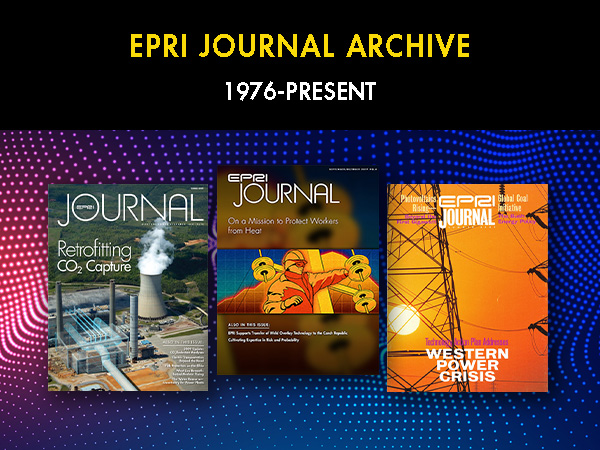Business and Economic Issues Become More Important for Sustainability at Utilities
When Morgan Scott was tasked with refining and updating Con Edison’s sustainability strategy in 2013, she gathered ideas from an EPRI report detailing 15 sustainability issues most relevant to the North American electric power industry. “That report helped us focus our sustainability efforts,” said Scott.
Four years later, Scott is an EPRI Senior Technical Leader working with hundreds of stakeholders to update that EPRI study, accounting for changes in the sustainability concept and the industry. After reviewing utility sustainability reports and publications by academics, non-governmental organizations, regulators, financial institutions, and consultants, Scott and her team identified 28 priority sustainability issues with economic, environmental, and social aspects.
Next, they interviewed experts at more than 35 organizations, including Harvard University, Stanford University, Wells Fargo, JP Morgan, Rocky Mountain Institute, Edison Electric Institute, and National Association of Regulatory Utility Commissioners. EPRI also surveyed staff at the 40-plus utilities that participate and share best practices in EPRI’s Energy Sustainability research steering committee.
Based on the findings, EPRI expanded the list from 15 to 20 issues, adding cyber and physical security, public policy relations, and others (see box at end of article). While environmental issues (such as greenhouse gas emissions and water) remained on the list, economic and business issues gained a stronger presence. These include supply chain, assets and operations, and customer relations.
“The industry’s understanding of the business implications of sustainability is changing,” said Scott. “Executive leadership is paying more attention to new technologies and the risks and opportunities they present to the long-term economic viability of utilities—and how all this relates to sustainability. This research demonstrates how the sustainability conversation has matured from setting up recycling programs and green teams to an in-depth look at value creation.”
EPRI circled back to the utilities and other stakeholders with specific questions about the 20 issues on the final list.
“It’s likely that each issue will not be equally relevant to all stakeholders, so we asked them whether each one was a high, medium, or low priority or not a priority at all,” said Scott. “We also asked them to forecast how priorities might change.”
The priorities most frequently cited are energy reliability and resiliency, safety and health, and cyber and physical security. Respondents viewed business model and cyber and physical security as increasing in importance the most over the next three to five years.
A report on the new list of key sustainability issues is expected this fall. Scott expects that utilities will use it to help update their sustainability strategies and initiatives. It will also help guide future EPRI research and updates to EPRI’s online sustainability benchmarking tool, which enables utilities to compare their performance with peers.
Electricity Sector Sustainability: Changes Since 2013
Compared to EPRI’s 2013 list of sustainability issues most relevant to the electric power industry, the 2017 list incorporates more economic and business issues.
|
2013 |
2017 |
| Reductions of other air emissions | Air emissions |
| Assets and operations* | |
| Economic viability of electric utilities | Business model |
| Climate change* | |
| Community support and economic development | Community vitality |
| Customer relations* | |
| Cyber and physical security* | |
| Energy affordability | Energy affordability |
| Energy reliability | Energy reliability and resiliency |
| Greenhouse gas emissions | Greenhouse gas emissions |
| Habitat protection and biodiversity | Habitat and biodiversity |
| Job satisfaction | Job satisfaction |
| Labor relations* | |
| Public policy relations* | |
| Employee safety and health; public safety and health |
Safety and health |
| Skilled workforce availability | Skilled workforce availability |
| Supply chain* | |
| Waste management | Waste |
| Water availability; Water quality |
Water |
| Engagement and collaboration | Workforce diversity, inclusion, and equal opportunity* |
*New issues identified in the 2017 assessment.
EPRI Technical Expert:
Morgan Scott
Further Resources:
- Material Sustainability Issues for the North American Electric Power Industry: Results of Research with Electric Power Companies and Stakeholders in the United States and Canada
- 2016 Sustainability Research Summary: Annual Review and Report Index
- Sustainable Electricity: Case Studies from Electric Power Companies in North America

